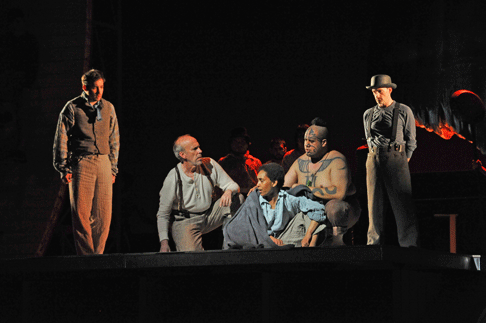Heggie — assisted by his seasoned librettist Gene Scheer — has
achieved something with Moby Dick that American opera has
not experienced in a long time: they have created a work of quality that should
garner itself an immediate place in the repertory of opera houses around the
world.
Announcement of the commission — Dallas Opera’s first for the
Wiinspear — raised eyebrows, for few could imagine a less operatic novel
than Hermann Melville’s 1851 detailed account of sailing and whaling.
Running 500 to 700 pages in standard editions, the book is often dark and
diffuse — everything that an opera cannot be, if it is to reach an
audience with its story. In a sense, of course, Melville made it easy for
Sheer, for the many exegesis on whaling were easily excised as the librettist
laid bare the soul of the novel in his focus on its characters.
As told in the opera Moby Dick is now a story that
explores the raw basic forces of life, underscoring the darkness that drives
men and sends them to perdition. The Great White Whale is only a means to that
end. Indeed, Sheer’s Ahab, the man who has lost a leg to the animal upon
whom he seeks revenge, is yet another Faust out to defy the
less-than-benevolent god embodied in the whale.
It is this confrontation with “the basics,” the unembellished
dark drives that send men on impossible adventures, that the audience feels
first-hand in this three-hour opera. “Feels,” one emphasizes, for
Heggie has written music — always accessible — that requires no
major act of mediation through performers. The score speaks always with telling
directness. There is never “time out” to be mere opera. It is
visceral music; now and then one puts up one’s hand in defense.
That’s why one is wrung out at the end of Moby Dick,
for one has been through it all with the many sailors on the Pequod. The opera
keeps attention riveted on the stage; the mind is not allowed to wander. Most
amazing aspect of the opera is that there is no feeling of condensation or that
anything has been left out. Heggie more than compensates in mesmerizing music
for the liberties taken with Melville’s text.
Heggie’s progress as a composer is documented throughout the score,
which is largely through-composed with arias and ensembles seamlessly woven
into it. The orchestral interludes are destined to take their place next to the
Sea Interludes from Benjamin’s Peter
Grimes.
Moby Dick is a Dallas co-commission with San Francisco,
San Diego and Calgary Operas and State Opera of South Australia, and one can
only hope that the other companies have the high-tech facilities that enabled
the Winspear to take full advantage of an awesome world of effects —
photos, projections and sets — that added so much to this initial
staging.

Director Leonard Foglia worked with the hand of a sorcerer to blend
projection designs by Elaine McCarthy into an overpowering and effective whole
with designs by Robert Brill and lighting by Donald Holder. Never did these
visual aspects threaten the primacy of Heggie’s score, in which there is
not one superfluous note.
Scheer achieved dramatic concentration by pairing Ahab — sung to
perfection by veteran Ben Heppner - with first mate Starbuck — stunningly
portrayed by Morgan Smith, a baritone at home in top German opera houses. They
interlock with a second pairing: native and noble Queequeg, engrossingly
portrayed by New Zealand Samoan Jonathan Lemalu, and Greenhorn, the young man
out — Parsifal-like — to learn fear — so touchingly sung by
young American tenor Stephen Costello.
Only in the final minutes of the work does Costello reveal that he is the
man called Ishmael who opens the novel. He is of special interest as the one
character who — in confronting fear — develops. The other three of
this basic quartet remain what they were when the curtain rose.
Sole female in the cast was Talise Trevigne, whose touching incarnation of
Cabin Boy Pip offered little hint of the successful Violetta, Lucia and Pamina
that have made her famous in Europe.
Moby Dick is rich in powerful choruses — the
major show-stoppers of the debut performance — admirable prepared by
Alexander Rom.
Patrick Summers, Heggie perennial collaborator, evoked magnificent playing
from the Dallas Opera Orchestra in giving birth to what is obviously a modern
masterpiece of music theater.
(The opera will enlighten a young generation by revealing the source of the
name Starbuck — even if it fails to explain the coffee company’s
aversion to apostrophes.)
Wes Blomster
![Moby-Dick [Photo by Karen Almond courtesy of Dallas Opera]](http://www.operatoday.com/Moby_08.gif)
